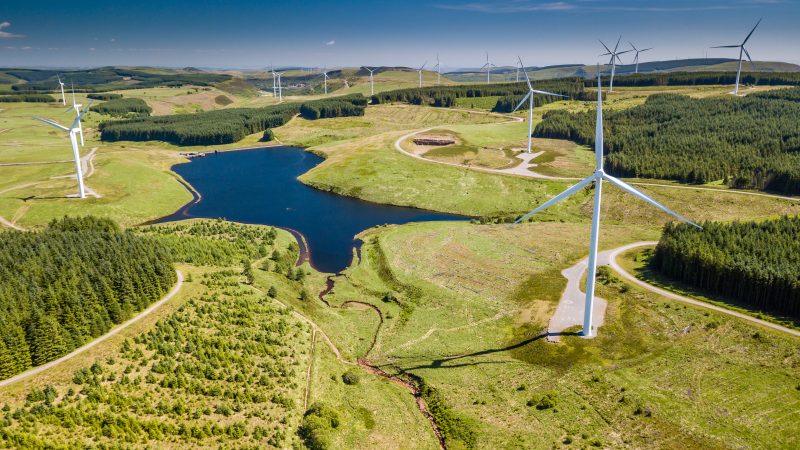
‘Phew, what a scorcher!’ used to be a headline that signalled a slow news day. But, now the heat is so extreme, it is the news. I remember the 1976 heatwave; the peak temperature that year was 35.9°C. This week, it could hit 40°C; trains cancelled; schools closed; roads melting.
Europe, North Africa and North America are on fire. Every year, extreme heat pushes us closer to tipping points. Arctic ice melts, and more heat is absorbed by the dark ocean. Forests burn, and more CO2 is released into the air. Permafrost thaws, releasing methane – 80 times more potent as a greenhouse gas than CO2.
Climate change doesn’t just mean hotter weather – it means more extreme weather. As more energy is stored in the atmosphere, we see more hurricanes and greater flooding. Changes to the oceans could switch off the Gulf Stream, making Britain’s winters more Baltic.
Wheat crops failed in Canada last year after the ‘heat dome’ cooked the Pacific North West. This year, India banned grain exports amid harvests failing in extreme heat. The Ukraine war has made it worse, but climate change is worldwide.
Every civilisation is only three meals away from anarchy. What happens when people run out of food? A breakdown of law and order. Mega migration in the hundreds of millions. Failed states. Climate disruption will collapse the world economy long before rising sea levels claim Lincolnshire. The current cost-of-living crisis will seem gentle if the world runs out of food.
Fossil fuel producers are making record profits while the cost-of-living crisis creates record child poverty during record temperatures. Yet we’re seeing Tory leadership candidates claim transitioning to a green economy is unaffordable. It’s not true. I know it’s not true because in the North of Tyne we’re creating thousands of highly-paid jobs in green industries. It generates wealth. What we can no longer afford is the mega-rich or the party of the mega-rich.
George Monbiot uses the phrase “micro-consumerist bollocks”. He’s describing the mindset that market forces and consumer choice will save us. That changing our drinking straws from plastic to paper is enough, and if we all do our bit, business as usual is fine.
I’m not going to tell a minimum wage worker that they have to buy a new zero-emissions car. Or someone struggling to pay their gas bill that they need to install a heat pump. Or, frankly, tell anyone that they should spend their days decoding the greenwash that corporations pump out so that they can reduce their personal carbon footprint. What needs to change is our economic system.
There’s a huge financial return from green investment. Nobody has to pay the wind to turn a turbine. The sun won’t run out for billions of years. More down to earth, every £1 invested in retrofit saves the NHS 42p from preventable health conditions caused by poor housing. Ending traffic congestion would save billions of pounds.
There is no shortage of money. There are literally trillions of pounds sloshing around the financial system. It’s just not being deployed into socially useful investment, but fuelling asset bubbles instead. There are two simple ways to change this.
One, there is more than £5tn in UK financial funds, including pensions. Change the law so they have to deploy an increasing percentage year on year into green investments. Retrofit, renewable energy, green transport systems, zero-carbon chemical manufacturing. And ratchet up the taxes on fossil fuels. Commerce and industry would bring forward a host of investable propositions to deploy this money. I know because I’ve had this conversation with CEOs of global firms. What they want is certainty, before they plunge £500m into developing new products. In the North of Tyne, we’re already doing this with our green new deal fund and advanced circular economy projects. We’ve surveyed our region and have a plan to decarbonise homes. But it needs national funding.
Two, a wealth tax. It’s grotesque that people doing a honest day’s work are taxed at a higher rate than income from shares, rent or capital gains. And that’s if the rich even pay their taxes. A wealth tax means people pay a very small percentage of their total assets above a threshold. One proposal is 1% of everything above £3.4m. So if your house, savings and shares total up to £3m, you don’t pay a penny. If you’re worth £4m, you pay 1% of the amount above the threshold. 1% of £600,000 is £6,000. If you’re worth £4m, you can afford £6,000 a year. A wealth tax on Britain’s richest 1% would raise £70bn to £130bn per year.
Tackling the climate crisis need not mean a future of sackcloth and ashes. Greener can mean fairer. Reducing wealth inequality allows us to invest in public luxury. Public transport that’s fast, comfortable and cheap. Public parks that are maintained and have funded events. Urban nature reserves. Proper arts funding. And here’s an idea: we educate our population for free!
But before we can do any of this, we must change our politics. We must break this mindset that tackling the climate emergency is a choice. It’s not. Either humanity deals with the climate emergency, or the climate emergency will deal with us.




More from LabourList
Reeves bets on patience over populism
‘Energy efficiency changes must work for older private renters’
‘Labour’s creative destruction dilemma’